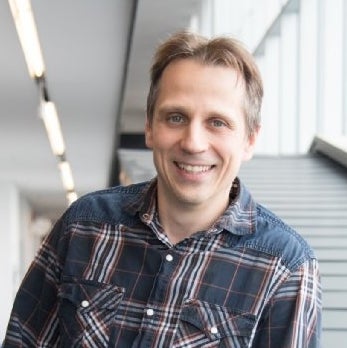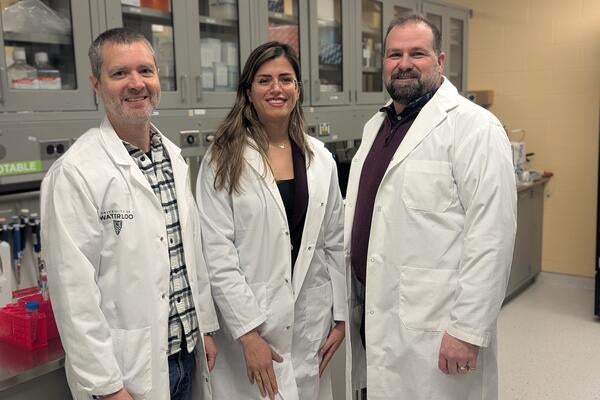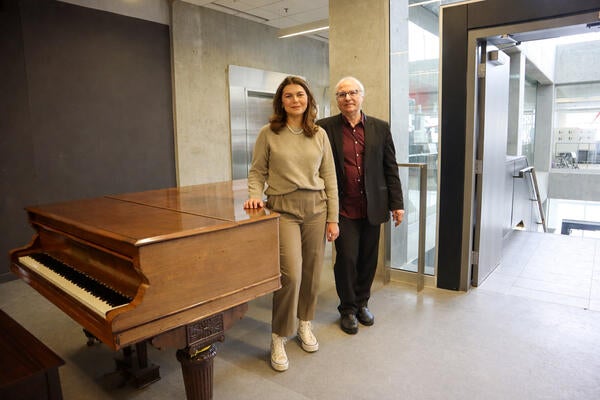
Improving the lives of older adults
Leading expert in human-computer interaction joins Waterloo Engineering as new Schlegel chair

Leading expert in human-computer interaction joins Waterloo Engineering as new Schlegel chair
By Amanda Brown Faculty of EngineeringCosmin Munteanu, a leading multidisciplinary researcher in human-computer interaction, has been appointed the new Schlegel Research Chair in Technology for Healthy Aging. Their research works at the intersection of aging and technology, focusing on facilitating meaningful and safe interactions between older adults and digital media devices.
Among their current research projects is the participatory creation of virtual worlds for seniors, allowing them to enjoyed shared meaningful experiences with loved ones, and modifications to platforms and devices that bridge generational gaps to enable older adults to spend time with family and friends online.
This position is a partnership between the Department of Systems Design Engineering (SYDE) at the University of Waterloo and the Schlegel-UW Research Institute for Aging (RIA). In this role, Munteanu will use nearly three decades of research experience to design intelligent applications and devices that improve access to information, support learning, and reduce digital marginalization for older adults.

Cosmin Munteanu is the new Schegel Research Chair in Technology for Health Agining.
“There is great potential for technology to contribute to enhanced quality of life and greater independence throughout the journey of aging,” said Tina Mah, Executive Director at the RIA. “We are thrilled to welcome Cosmin to the RIA and support the development of new technologies to meet the needs of older adults.”
Munteanu previously served as an Associate Professor at the Institute for Communication, Culture, Information, and Technology at University of Toronto Mississauga and Director of the Technologies for Aging Gracefully (TAG) lab. They will join SYDE as an Associate Professor and continue their work with the TAG lab.
“Cosmin has an impressive drive to innovate engineering design processes to be more inclusive of user experience and diverse expertise,” said Lisa Aultman-Hall, Professor and Chair of Systems Design Engineering. “Their work generates relevant and effective solutions to complex societal problems through a transdisciplinary approach that is grounded in the real-world experiences of older adults.”
Munteanu’s area of expertise is voice and multimodal interaction, and usability of these interfaces for older adults. Voice interfaces, seen in Siri and Google Home, have great potential to benefit older adults because they could address not only accessibility but also socio-technical and cultural barriers. Their research explores participatory approaches to designing voice interfaces that make these interactions more natural and empowering for older adults.
“I am excited to join the RIA and SYDE in this new role as Schlegel Chair,” said Munteanu. “The human and society-focused innovation culture nurtured within the RIA and SYDE partnership, and the outstanding community embedded research carried out by the current Schlegel Chairs, are unique in their capability to drive meaningful transformations to the design of age-tech. I look forward to further contributing to improving the lives of older adults, through an inclusive, participatory research agenda centred around emerging technologies such as voice or virtual interactions.”
Munteanu will have lab space in the RIA building at the Centre of Excellence for Innovation in Aging on the north campus of the University. The centre integrates senior living with research, education, and community services. It is home to over 400 older adults who live in the onsite long-term care and retirement home operated by Schlegel Villages. This co-location provides opportunities for community-based research and the development of new technologies in collaboration with those who will benefit from them.
Munteanu's appointment at the RIA and SYDE begins July 1.
Main photo by Matthias Zoomer from Pexels.

Read more
Researchers engineer bacteria capable of consuming tumours from the inside out

Hand holding small pieces of cut colourful plastic bottles, which Waterloo researchers are now able to convert into high-value products using sunlight. (RecycleMan/Getty Images)
Read more
Sunlight-powered process converts plastic waste into a valuable chemical without added emissions

University of Waterloo researchers Olga Ibragimova (left) and Dr. Chrystopher Nehaniv found that symmetry is the key to composing great melodies. (Amanda Brown/University of Waterloo)
Read more
University of Waterloo researchers uncover the hidden mathematical equations in musical melodies
The University of Waterloo acknowledges that much of our work takes place on the traditional territory of the Neutral, Anishinaabeg, and Haudenosaunee peoples. Our main campus is situated on the Haldimand Tract, the land granted to the Six Nations that includes six miles on each side of the Grand River. Our active work toward reconciliation takes place across our campuses through research, learning, teaching, and community building, and is co-ordinated within the Office of Indigenous Relations.